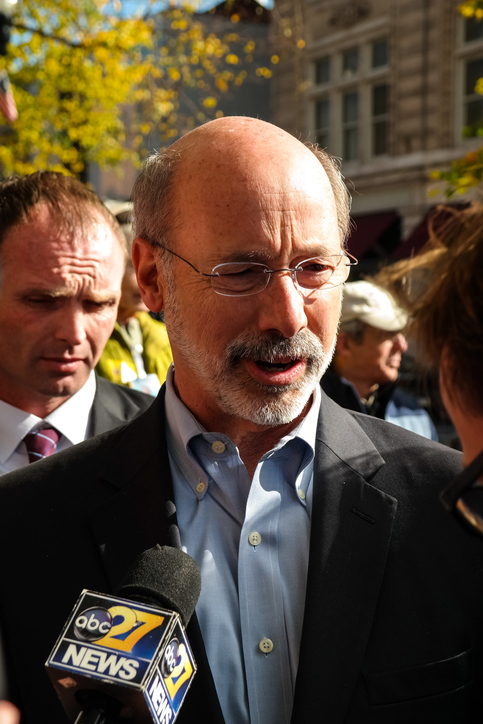In the latest skirmish between Pennsylvania Democratic Gov. Tom Wolf and the Republican-controlled legislature, the Pennsylvania Environmental Quality Board (EQB) approved a regulation called for by Wolf establishing a statewide cap-and-trade system.
Wolf says implementing this regulation will open the way for Pennsylvania to join the Regional Greenhouse Gas Initiative (RGGI), a compact among 11 Mid-Atlantic and northeastern states, stretching from Virginia to Maine with a region-wide cap-and-trade system established to reduce carbon dioxide emissions from power plants 30 percent by 2030.
Steps and Battles Remain
With the EQB’s 15 to 4 vote in favor of the regulation, referred to as the Pennsylvania Climate Action Plan, it proceeds for review to the state’s Independent Regulatory Review Commission and several legislative committees for hearings.
The regulation would require power plants that generate electricity through the burning of fossil fuels to purchase emission credits issued by the state for each ton of carbon dioxide emitted up to a cap set by the state. The cap would decline overtime and power plants would be able to trade emission credits
Wolf’s administration estimates 66 electricity-generating plants with 158 units would have to buy credits, or generate them by completing projects which offset their emissions.
Adoption of such a scheme will put Pennsylvania on a similar footing with current RGGI member states. Wolf’s stated goal is to have Pennsylvania join RGGI in early 2022.
Unlike current RGGI members, however, Pennsylvania is a major producer of fossil fuels, being the nation’s second-largest producer of natural gas, behind Texas. Joining RGGI with its anti-fossil-fuel policies would put the state at odds with one of its biggest industries.
It is uncertain whether enough Democrats will join Republicans to block the plan legislatively. Even if the regulation survives the legislative process, it is almost certain to face a court challenge from the Republican members of legislature and affected power plants.
Governor’s Authority Questioned
The Wolf administration argues it has the authority to limit carbon dioxide emissions and charge a fee for such emissions under the state’s Air Pollution Control Act.
Wolf signed an executive order in October 2019 to begin the process of Pennsylvania joining RGGI.
He set a goal of reducing the state’s greenhouse-gas emission 26 percent by 2025 and 80 percent by 2050, compared to 2005 levels.
The Pennsylvania Climate Action Plan is illegal because the program amounts to a tax, and taxes can only be authorized by the legislature, said Pennsylvania state Rep. Daryl Metcalfe (R-Cranberry), chairman of the House Environmental Resources and Energy Committee, at a public EQB meeting in July.
“If you vote to move this regulation forward, you are voting for an action that violates our law, violates our constitution, and will cost the commonwealth substantial resources in an attempt to defend this in court,” Metcalfe said.
Wolf and Republican lawmakers have been grappling over a statewide cap-and-trade program and RGGI membership for some time.
A bill to block Pennsylvania’s Department of Environmental Protection from taking any action to limit carbon dioxide emissions passed the Senate in June by a veto-proof majority, including six votes from Democrats. The House has indicated it will take the bill up in September.
‘A Useless Burden’
The EQB’s plan will hamper economic growth in Pennsylvania while doing nothing to protect the environment or prevent climate change, says Tirzah Duren, a policy analyst at the Commonwealth Foundation.
“What is often lost in the discussion around RGGI is that it doesn’t work,” said Duren. “Emissions aren’t reduced beyond the regular industry progress, and the investments from the program fail to produce the desired results.
“Emissions in Pennsylvania have already been reduced by more than 20 percent between 2000 and 2018, without RGGI,” Duren said. “The proposed regulation amounts to a useless burden on the natural gas industry, which contributes to economic growth, brings jobs to the state, and produces cheap energy.”
Bonner R. Cohen, Ph.D., (bcohen@nationalcenter.org) is a senior fellow at the National Center for Public Policy Research and a senior policy analyst with Committee for a Constructive Tomorrow, which co-publishes Environment & Climate News.
Legislative Contacts
Pennsylvania state Rep. Daryl Metcalfe (R-Cranberry): http://www.repmetcalfe.com/; https://www.pahouseformcenter.com/422/RepDarylMetcalfe/SecureContact
